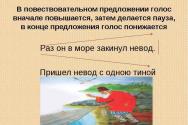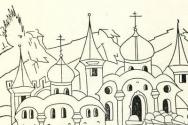Essay on the topic: The fate of a master in Russia in the story Lefty, Leskov. The tragic fate of a talented person in the tale “Lefty” Everyone knows the sad story of the left-handed Zakharov
Thoughts about rejection and even open mockery in Russia of smart, talented, but belonging to the lower class individuals were among the most important topics that worried the writer Nikolai Leskov. In one of his letters, he once noted that a simple, hard-working and at the same time immensely talented man in our country is taken for granted, something that will always be there and something that makes no sense to patronize.
Leskov categorically disagrees with this trend, believing that any person has the right to have normal living and working conditions, and a talented person working at full capacity for the benefit of his homeland has a doubly right to this. His tale “Lefty” is just some kind of proof of the tragic fate of the Russian people and the need for drastic changes.
In the tale, the true defenders of the glory of their homeland are the craftsmen from Tula, who managed to shoe a flea, and who, in a talent competition with the British, were able not only to demonstrate their boundless talent, but also to maintain dignity and a sense of patriotism.
Lefty is one of the Tula masters, whom it was decided to take with him to the sovereign, and then to Europe in order to demonstrate his work. He has accomplished the impossible, but does not become arrogant and accepts the need to meet with the sovereign as a working moment. He comes to the meeting in his old clothes. He did not try to flatter the emperor, did not try to please him, he spoke quietly, calmly and simply, as best he could. Everyone around was amazed at this simplicity, trying to hint at the need to be more helpful. Lefty, of course, understood that the ruler of the country was standing in front of him, but this did not in any way affect the manner of his communication. He treated everyone modestly and respectfully, be it the sovereign or his fellow worker. For Lefty, all people are equal.
Indeed, manners and expensive clothes are insignificant in front of true talent: clothes can wear out, manners can be forgotten in certain situations, but talent will always remain with a person.
Lefty, thanks to his ingenuity and golden hands, reached the emperor and abroad, became a very unhappy person. In fact, his new environment did not understand him at all. And the temporary increased attention to a man is only ostentatious. They washed him in the bathhouse, changed his clothes and took him with them to London. But he spends the entire journey without eating a bite and maintains his strength only with Platov’s sour milk. The Emperor publicly kisses Lefty, but does nothing to make his life better or even truly thank him for what he has done.
In contrast to the Russians, the British show humane care for Lefty and strive to create for him all the conditions for a good trip. Compatriots do not see in the master a person who is worthy of even a drop of respect; for them he is a slave, obliged to do all this. The British invite Lefty to join them, promising decent work and remuneration. But despite this, our master dreams only of Russia, and longs to return home as soon as possible. In your dark closet.
He returned to St. Petersburg in a sick state, as he had been drinking all the way on a bet with the skipper. However, upon arrival, the skipper is sent to the hospital, where he is quickly brought to his senses. O simple man, Lefty drags himself all night with exceptional carelessness from the doors of one hospital to another, and, without receiving proper help, dies. A man who glorified his country, instead of honor and respect, received complete indifference. Left-handed people were not accepted in hospitals because he did not have a document or money.
But Lefty was not mentally broken until the very last minute of his life: he was only worried about how to convey the information that the British did not clean their guns with bricks, and this made them last longer. He was the only one wise man With with an open soul, the only patriot of his country among the masses of heartless people who have lost the purity of their souls in the pursuit of fame and material wealth.
The tale of Lefty who shoed a flea became a legend, and Lefty himself became a symbol of the boundless talent of the ordinary Russian person, often oppressed and forgotten.
Music of songs on a school theme sounds
Of the writers of the second half of the 19th century, the greatest contribution to the knowledge of Russia was made by Tolstoy, Dostoevsky, and by the very end of the century - by Chekhov. But next to them stands another figure, a huge, angular, not fully studied figure, the figure of Nikolai Semenovich Leskov.
His creativity is extensive. The writer’s books include novels, satirical stories, and chronicles. He created everyday and travel essays, a series of brilliant short stories, and classic stories.
But Leskov also created a gallery of positive images, and sharply original ones.
Historical stories are imbued with this originality, their contents are directed to the past, which is called the “deaf time”.
At the center of most of Leskov’s historical stories is a “righteous man” - a man of a noble idea, enormous talent, living in an “unrighteous” social world. The nation produces “righteous people” from all walks of life, but most of all from among the common people.
So in the story “Lefty” the author depicts the fate of a man without a name, the gunsmith Lefty, the fate of a Russian genius. Genius creates...a trinket. A poor man “in rags and a shabby ABC”, who studied “from the Psalter and the Half-Dream Book”, who did not know “any arithmetic”, managed to do something “beyond concept” - he shod a London flea with the smallest Tula horseshoes and also engraved the names of Russian workers on them.
This is a paradox, but, according to Leskov, people in Russia are completely at the mercy of the paradox, because Russian life is a tragic farce.
Lefty's patriotism and talent were used to satisfy the vanity of “Sovereign Nikolai Pavlovich.” A left-handed person is helpless and not needed when he wants to accomplish a civic feat. It is not the Tsar who needs it, but Russia.
“Tell the sovereign that the British don’t clean their guns with bricks: let them not clean ours either, otherwise, God forbid war, they’re not good for shooting,” says the dying Lefty. But Count Chernyshov, to whom the doctor conveys the master’s last words, shouts to the slow-moving aesculapian: “Don’t interfere with your own business!” In Russia there are generals for this!” Lefty's words die with him, and in the Crimean company this turns into a disaster for Russia.
The drama of Lefty is the historical drama of the homeland, where there is completely the dominance of “ceremonial generals”, voicelessness, and lack of rights of the people.
Here is the scene where Platov accepts work from Tula masters. There is so much humor and sarcasm here at the same time! Depicting the worthlessness of the ruling elite, the author writes: “Platov wanted to take the key, but his fingers were stubby: when he caught it, he could not grab either the flea or the key to its abdominal plant.” And now the anger from powerlessness is transferred to Lefty:
“... he reached out his hand, grabbed the sideways Lefty by the collar with his stubby fingers, so that all the hooks from his Cossack flew off, and threw him into the carriage at his feet.” And Lefty went to report to the king instead of the “pubel” /poodle/. There are a great many such words and figures of speech that require “translation” in the story. The language in this “tale” is unusual.
All foreign words translated in the most witty way: barometers - “storm meters”, microscope - “small scope”, feuilleton - “slander”. It seems that since Gogol there has not been a writer in Russia who was so able to capture the living flutter of a word. That is why the art of prose storytelling, begun in literature by Rudy Panko, was raised precisely by Leskov to the height of a national artistic phenomenon.
The language is unusual, and the situations are unusual. So the king looked at the names of the craftsmen on the horseshoe of the English flea, but the name Lefty was not there. And why? But because the master “worked smaller than these horseshoes.” He forged the nails with which the horseshoes are hammered. And here no “small scope” will work. How simply and casually the illiterate Russian man explained all this to the Tsar. And what great art lies behind his words! The master behaves with dignity in this situation. He did what he considered an ordinary job. What's wrong with this? But in vain Platov tore his hair off!
This is how the words of the men Saltykov-Shchedrin come to mind: “We are decent people, we can do anything!” And indeed, accustomed to beatings and shaking, Lefty calmly says in response to Platov’s apologies: “God will forgive! This is not the first time we have had such snow on our heads!” The scenes of Lefty's stay abroad are interesting. No matter how the British cajoled him, no matter how they begged him to stay forever. Lefty answered: “I have parents at home.” One word - parents. How many other words does it contain? This is the homeland, and the clan, and the native side, which is not bribed or sold.
Lefty behaves very honorably in England, he did not lose honor to Russia, but how did she greet him after his return? It is impossible to read these lines without pain: “...they just searched him, they took off his motley dress, his watch with a chime, and they took his money...”.
Lefty lay on the “cold parapet” and died in the common Obukhvin hospital, before his death thinking about Russia: “That’s not how we clean our guns!”
With his work, Leskov had the greatest influence on Chekhov, where we see “abnormalities of phenomena” in normal stories. We see new righteous people in Gorky’s stories “The Tsar’s Clerks” and Kuprin’s provincial life.
“As an artist of words, Leskov N.S. fully worthy to stand next to such literary creators as L. Tolstoy, Gogol, Turgenev, Goncharov.
Leskov’s talent in strength and beauty is slightly inferior to the named authors, and in the breadth of coverage of life phenomena and subtle knowledge of language, he rarely exceeds the named predecessors,” said M. Gorky.
These words forever confirm Nikolai Leskov’s place in the history of Russian literature.
In the tale, the true arbiters of events aimed at exalting the glory of Russia are Lefty and his comrades - those Tula masters to whose art they entrust the English wonder. It is they who demonstrate by their behavior true dignity, calm firmness of spirit, and a full consciousness of national responsibility. Thinking over the current situation, they judge it, not allowing any overlapping of assessments in one direction or another: “... the Aglitsky nation is also not stupid, but rather cunning, and there is art in it.” makes a lot of sense. “We must take on it, they say, after thinking and with God’s blessing.” Such behavior, free from empty vanity, contrasts particularly sharply with the pettiness of the motives of the Russian tsars.
This plot twist expresses the writer’s favorite idea about “little great people” who, standing aloof from historical events, decide the historical destinies of the country. “These are straightforward and reliable people,” Leskov will speak of them with respect and warmth in his later story “The Man on the Clock,” coming closer to L. Tolstoy in his assessment of the democratic masses.
However, this is in highest degree The writer’s respectful attitude towards the Tula masters does not at all exclude gentle irony towards them in the tale. Leskov is far from idealizing the people's capabilities here; he soberly assesses them. The writer took into account the role of socio-historical circumstances that limit the creative powers of the people, imposing on many Russian inventions the stamp of buffoonish eccentricity or practical incongruity.
From this point of view, for understanding the general meaning of the tale, it is fundamentally important” that the very result of the “relentless”, selfless and inspired work of the Tula masters is fraught with an “insidious” duality of impression: they really manage to create a miracle - to forge a “nymphosoria”. And yet their superiority is not absolute. An eye-savvy flea can no longer “dance.” The “improved” English wonder turns out to be hopelessly broken at the same time.
In the development of the plot, this unfortunate moment for the prestige of Russian invention receives its specific explanation, which is important for understanding the general idea of the tale. As the English rightly judge, the Russian masters, who showed amazing audacity of imagination, obviously did not know “calculation of force,” and Lefty has to agree with this: “There is no doubt about this,” he says, “that we have not gone far enough in the sciences...”
Thus, in the depiction of the amazing work of Tula masters, which simultaneously elevates them above their overseas rivals and reveals their well-known weakness, Leskov’s bitter, alarming thought about Russian ignorance, alien to any conciliatory and apologetic tendencies, expresses itself. in a cruel way oppresses and fetters the great strengths and capabilities of the people, dooming them to a series of defeats and setbacks.
The question of what a Russian person can do immediately entails in Leskov’s tale no less important questions: how this person lives, whether he, like the English masters, has “absolute circumstances” for the development of his talent, what kind of attitude he faces from those in power, how his fate develops.
True, neither the narrator nor Lefty himself, who have become accustomed to a certain order of things that has long been established in Russia (contrasting with the one that Platov and Lefty saw in England), ask themselves these questions, but the writer takes special measures to ensure that they inevitably became inevitable in the minds of his readers.
Telling, for example, with what “ceremony” Platov rode, fulfilling the sovereign’s order, Leskov paints the figures of “whistling” Cossacks, who sit on both sides of the coachman’s beam and throughout the entire journey constantly shower their driver with whip blows “These incentive measures were in effect before It was successful that nowhere could the horses be kept at any station, and a hundred races always jumped past the stopping place.
The narrator himself does not emphasize such details; he speaks about them casually, casually, as if by the way. However, all these “little things” of Russian life included in his narrative - the ingenious cutting of the coachmen, Platov’s rude swearing at the Tula masters, the almost arrest of Lefty, who is being taken to St. Petersburg in the front of Platov’s wagon, the haste of his departure to England - all these are phenomena of one thing order, accumulating in themselves the general spirit of Russian life of Nicholas's times with its unbridled autocracy of some and lawlessness of others, a spirit that inspires the author with the most bitter feeling.
Saturated with the sad details of the death of Lefty, the last chapters of the story even more persistently focus the reader’s attention on the situation of the individual in Russia, where “it’s scary for a person.” A talented master, an artist of his craft, deeply devoted to his fatherland, dies, forgotten by everyone, in the corridor of the Obukhov hospital for the poor, without having time to serve his country with his last advice. This conclusion to the plot, which contains a bitter paradox, enhances the sound of the humanistic theme of the tale - the tragic fate of a talented person in Russia, doomed to waste away a lot of opportunities without worthy use.
Tragic fate talented person in the tale “Lefty”
Other essays on the topic:
- Poets silver age created in a very difficult time of catastrophes and social upheavals, revolutions and wars. To poets in Russia in that...
- "Rusalka" - an experience of drama from folk life, created on the basis of a semi-legendary plot, but deeply social in its content. Tragic fate...
- The heroes of Ostrovsky's plays most often become women. Of course, these women are extraordinary and extraordinary individuals. Suffice it to recall the heroine of the drama Thunderstorm...
- "Belkin's Tales" is a diary of provincial Russia. Here is the “martyr of the fourteenth class”, the collegiate registrar, the caretaker of one of the thousands of small postal stations, the poor...
- The main line of the narrative is the fate of Taras, closely intertwined with the general course of events: and here an interesting feature of the development of the image and...
- , you can survive in the heat, in thunderstorms, in frosts. Yes, you can go hungry and cold, go to your death... But these three...
- In N. S. Leskov’s story “Lefty” the main actor is a Tula oblique master, a self-taught left-hander. However, the hero does not appear immediately...
- Civil War V Russian Empire, which overwhelmed her at the beginning of the last century, became one of the saddest moments in her history....
- In the post-war years, the artist was haunted by the disturbing memory of the war. Developing the experience of domestic battle classics, best traditions Soviet literature, Sholokhov...
- The story was written in 1956 during Khrushchev’s “thaw”. Sholokhov was a participant in the Great Patriotic War. There he heard the story of life...
- Second World War- this is the greatest tragic lesson for both man and humanity. More than fifty million victims, countless destroyed villages...
- “Yes, you can survive in the heat, in thunderstorms, in frosts. Yes, you can starve. Go to death... But these three birches with...
- “Divo” is the fate of talent. “Death in Kyiv” is the fate of the state idea. "Pervo-Most" - the fate of the people's building. "Eupraxia" is...
- LESSON PROGRESS I. Discussion of Topics of Essays Proposed by Students and Plans for Topics Pay attention to the relevance of the topic, the ambiguity of its solution,...
- The literary heritage of the talented poet is small and has not yet been fully collected. Diary entries and private letters containing...
- Pushkin set himself the task of creating a folk tragedy as opposed to a court tragedy, and he brilliantly accomplished it. “What develops in a tragedy? What...
- “From the Soviet Information Bureau...” - these words, which began reports on events on the fronts of the Great Patriotic War, are remembered by front-line soldiers, these words...
One of best works N.S. Leskova is considered famous fairy tale"Lefty." It was in it that the author managed to create the image of a talented Russian person who is distinguished by his hard work and sense of humor. Thus, Leskov showed not an individual person, but an entire people, because, in fact, Russia has always been famous for its courage and originality.
First of all, it should be noted that the entire tale is imbued with deep patriotism and faith. Every person asked God's blessing before any business. The author also shows that the Russian people do not like fame, but only try with all their might to preserve their honor. The tragedy of the fate of such people is shown in the fact that many of them were trampled and persecuted.
Lefty, as a prominent representative of a talented person in Rus', calmly comes to the sovereign in old clothes, which have long since become obsolete. He is not trying to flatter his superior in any way. There is not a drop of servility in him. Everyone around began to be surprised when he spoke to the sovereign simply and serenely. Yes, Lefty understood that he was talking to supreme man, but this did not affect his character in any way. He remained himself. The crowd tried to hint him how to behave, but could not get anything from this simple Russian man. Even the ruler himself said: “Leave it..., let him answer as best he can.”
Leskov's main task in this episode was to show the insignificance of manners, flattery and appearance in front of real talent. After all, you can dress any passerby beautifully and teach him various elegant words, and talent is something that is given by nature. This is something that no one can ever leave.
The traits of patriotism in Lefty were evident throughout the tale. The British tried with all their might to somehow induce him to change his behavior, but they were never able to achieve what they wanted. We constantly hear phrases that only emphasize love for the Motherland: “We are all committed to our homeland,” “I have parents at home,” “Our Russian faith is the most correct, and as our forefathers believed, our descendants should believe the same way.” "
Lefty found himself among an abundance that could captivate many. But all this affects the hero in a completely different way. The more amenities tasty food and clothes, the more he yearned for Rus': “As we left the buffet into the Solid Earth Sea, his desire for Russia became such that it was impossible to calm him down...”
The fate of Lefty is truly tragic. He returned to his homeland, but instead of a good-natured welcome, he received real indifference. His death is meaningless. This happened very often in the history of the Russian people. Talents perish, being neglected by their contemporaries. And only descendants, with their bitter tears and memories, still retain the memory of such great people.
No matter how scary this passage may sound, it accurately conveys the truth of life: “They were transporting Lefty so uncovered, and as soon as they transferred him from one cab to another, they dropped everything, but when they picked him up, they tore his ears, so that he would remember. They brought him to one hospital - they wouldn’t admit him without a certificate, they brought him to another - and they wouldn’t admit him there, and so on to the third, and to the fourth - until the morning they dragged him through all the remote crooked paths and kept changing them, so that he was completely beaten up.”
Even on his deathbed, Lefty worries about his people: “Tell the sovereign that the British don’t clean their guns with bricks, even if they don’t clean ours either, otherwise God bless war, they’re not good for shooting.”
Lefty is truly a symbol of the Russian people, who are rich in talented craftsmen who are patient and honest.
Updated: 2014-05-30
Attention!
Thank you for your attention.
If you notice an error or typo, highlight the text and click Ctrl+Enter.
By doing so, you will provide invaluable benefit to the project and other readers.
In the tale, the true arbiters of events aimed at exalting the glory of Russia are Lefty and his comrades - those Tula masters to whose art they entrust the English wonder. It is they who demonstrate by their behavior true dignity, calm firmness of spirit, and a full consciousness of national responsibility. Thinking over the current situation, they judge it, not allowing any overlap of assessments in one direction or another: “... the English nation is also not stupid, but rather cunning, and art in it has a lot of meaning. Against her -
They say, “you have to take it after thinking and with God’s blessing.”
Such behavior, free from empty vanity, contrasts particularly sharply with the pettiness of the motives of the Russian tsars.
This plot twist expresses the writer’s favorite thought about “little great people” who, standing aloof from historical events, decide the historical destinies of the country. “These are straightforward and reliable people,” Leskov will speak of them with respect and warmth in his later story “The Man on the Clock,” coming closer to L. Tolstoy in his assessment of the democratic masses.
However, this highly respectful attitude of the writer towards the Tula masters does not at all exclude gentle irony towards them in the tale. Leskov is far from idealizing the people's capabilities here; he soberly assesses them. The writer took into account the role of socio-historical circumstances that limit the creative powers of the people, imposing on many Russian inventions the stamp of buffoonish eccentricity or practical incongruity.
From this point of view, for understanding the general meaning of the tale, it is fundamentally important” that the very result of the “relentless”, selfless and inspired work of the Tula masters is fraught with an “insidious” duality of impression: they really manage to create a miracle - to forge a “nymphosoria”. And yet their superiority is not absolute. An eye-savvy flea can no longer “dance.” The “improved” English wonder turns out to be hopelessly broken at the same time.
In the development of the plot, this unfortunate moment for the prestige of Russian invention receives its specific explanation, which is important for understanding the general idea of the tale. As the English rightly judge, the Russian masters, who showed an amazing audacity of imagination, obviously did not know “calculation of force,” and Lefty has to agree with this: “There is no doubt about this,” he says, “that we have not gone too far in the sciences...”
Thus, in the depiction of the amazing work of Tula masters, which simultaneously elevates them above their overseas rivals and reveals their well-known weakness, Leskov’s bitter, alarming thought about Russian ignorance, which cruelly oppresses and fetters great forces, expresses itself, alien to any conciliatory and apologetic tendencies and the capabilities of the people, dooming them to a series of defeats and setbacks.
The question of what a Russian person can do immediately entails other equally important questions in Leskov’s tale: how does this person live, does he, like the English masters, have “absolute circumstances” for the development of his talent, what attitude does he have towards himself? faced by those in power, how his fate turns out.
True, neither the narrator nor Lefty himself, who have become accustomed to a certain order of things that has long been established in Russia (contrasting with the one that Platov and Lefty saw in England), ask themselves these questions, but the writer takes special measures to ensure that they inevitably became inevitable in the minds of his readers.
Telling, for example, with what “ceremony” Platov rode, fulfilling the sovereign’s order, Leskov paints the figures of “whistling” Cossacks, who sit on both sides of the coachman’s beam and throughout the entire journey constantly shower their driver with whip blows “These incentive measures were in effect before It was successful that nowhere could the horses be kept at any station, and a hundred races always jumped past the stopping place.
The narrator himself does not emphasize such details; he speaks about them casually, casually, as if by the way. However, all these “little things” of Russian life included in his narrative - the ingenious cutting of the coachmen, Platov’s rude swearing at the Tula masters, the almost arrest of Lefty, who was being taken to St. Petersburg in the front of Platov’s wagon, the haste of his departure to England - all these are phenomena of one thing order, accumulating in themselves the general spirit of Russian life of Nicholas's times with its unbridled autocracy of some and lawlessness of others, a spirit that inspires the author with the most bitter feeling.
Saturated with the sad details of the death of Lefty, the last chapters of the story even more persistently focus the reader’s attention on the situation of the individual in Russia, where “it’s scary for a person.” A talented master, an artist of his craft, deeply devoted to his fatherland, dies, forgotten by everyone, in the corridor of the Obukhov hospital for the poor, without having time to serve his country with his last advice. This conclusion to the plot, which contains a bitter paradox, enhances the sound of the humanistic theme of the tale - the tragic fate of a talented person in Russia, doomed to waste a lot of opportunities within himself without worthy use.
(No Ratings Yet)
Related posts:
- The famous fairy tale “Lefty” is considered one of the best works of N. S. Leskov. It was in it that the author managed to create the image of a talented Russian person who is distinguished by his hard work and sense of humor. Thus, Leskov showed not an individual person, but an entire people, because, in fact, Russia has always been famous for its courage and originality. First of all, it should be noted that [...]
- For me, Leskov N.S. has always been a special artist: in his work there are no unnecessary words, no lengthy arguments by the author. His prose is paintings, almost like photographs, but slightly embellished so that it would not be so sad to look at reality. In the first place, in my opinion, among all his works is “Lefty”. This tale has amazing properties: [...]
- The life of the people is main topic creativity of N. S. Leskov. In his works he did not try to teach people how to live. The author was simply imbued with life ordinary people. I didn’t invent the heroes of my stories, I took them from life: eccentrics, good-natured people, generous, harmless. In the talent of the Russian people, the writer saw the purity and righteous path of his country and its people. Here […]...
- “Lefty” has an amazing literary destiny. Having appeared in print, this thing immediately gained popularity, but criticism received it ambiguously. Leskov was accused of a lack of patriotism, of mocking the Russian people, but critics agreed on one thing: the author had heard enough stories of Tula artisans and “concocted” his “Lefty” from them. Meanwhile, the tale was invented by the author from the first to the last [...]
- Nikolai Semenovich Leskov’s fairy tale “Lefty” is a work of amazing fate. Many critics believed that in it Leskov was laughing at the Russian people, that he simply collected the stories of Tula artisans into one work. This suggests that Leskov knew very well the life of the people, their character, speech and morals. Leskov invented this work himself - such a wonderful writer […]...
- Along with a huge number beautiful works of the last century, those “eternal questions” that so worried the Russian classics and which some tried to solve by preaching “non-resistance to evil through violence”, some by building their “crystal palace”, others called to overthrow by force came to modern literature. hated system... Different times have come, but the problems remain the same: “what is good and […]...
- “Fate leads a person, but a person goes because he wants, and he is free not to want.” V. Grossman. The theme of the tragic fate of a person in a totalitarian state is one of the most important in the works of A. Platonov, A. Solzhenitsyn, V. Grossman, Yu. Dombrovsky... And this tragedy lies not only in the bloody tyranny and lawlessness of the Stalinist regime. The repression that fell upon millions of innocent […]...
- The Russian writer of the 19th century N. S. Leskov was an expert on Russian patriarchal life. He was called a writer of everyday life for his excellent knowledge of the psychology and morals of the peasantry, artisans and workers' artels, officials of various ranks, the clergy, the intelligentsia and the military. He became famous as an original master of the Russian language and a talented satirist, exposing the injustice of the authorities. In the 60s of the 19th century, when Leskov began his […]...
- Leskov Nikolai Semenovich 1831-1895 Lefty (the tale of the Tula slanting left-hander and the steel flea) In genre, the work resembles a fairy tale or legend; the text contains a lot of ancient expressions and words, thanks to which we imperceptibly find ourselves in that era. This is a story about the unprecedented skill of Tula gunsmiths, about the ordinary Russian people who believe in God and with zeal [...]
- Sholokhov is one of those writers for whom reality is often revealed in tragic situations and destinies. The story “The Fate of Man” is a true confirmation of this. For Sholokhov it was very important to succinctly and deeply concentrate the experience of the war in the story. Under the pen of Sholokhov, this story becomes the embodiment of human destinies in war, a story about the greatness, strength and beauty of an ordinary Russian […]...
- In this story, Sholokhov depicted the fate of an ordinary Soviet person who went through the war, captivity, who experienced a lot of pain, hardships, losses, deprivations, but was not broken by them and managed to maintain the warmth of his soul. For the first time we meet the main character Andrei Sokolov at the crossing. We get an idea of him through the impression of the narrator. Sokolov is a tall, stooped man, he has large dark hands, eyes […]...
- The question of fate and a prosperous path in life has worried people, probably throughout the entire history of mankind. Why are some people happy and calm, while others are not, why fate favors some and persecutes others? evil rock? IN Explanatory dictionary we find several definitions of the concept “fate”: “a confluence of circumstances independent of a person’s will, the course of life events”; “share, fate”; "story […]...
- The fate of a master in Russia N. S. Leskov wrote many works about the people. This is one of the first Russian writers to describe a simple Russian peasant with all his characteristic individual traits. At first, contemporaries did not appreciate Leskov’s work, since it seemed incomprehensible to them, but over time, the writer’s contribution to the field of literature became obvious. He worked in different genres, [...]
- The genre is determined by the author himself - this is a tale, a work of oral folk art based on traditions and legends. The language of the tale is unusual: many words are distorted, as if they were pronounced by an illiterate person: “melkoskop” (microscope), “ceramides” (pyramids), etc. This is one of the means of humorous depiction. This is a story about the unprecedented skill of Tula gunsmiths, about the ordinary Russian people who believe in […]...
- Sholokhov Mikhail Aleksandrovich is a talented writer who touched upon military themes in his work “The Fate of Man.” The author closely connects the life of the protagonist and the fate of his Motherland, because in the biography of one person he manages to show the lot of the powerful Russian people. The content of the work is a person’s encounter with the harsh trials of life and an attempt to defend the right to exist. Sholokhov wrote […]...
- The heroes of Ostrovsky's plays most often become women. Of course, these women are extraordinary and extraordinary individuals. Suffice it to recall the heroine of the drama “The Thunderstorm” Katerina. She is so emotional and impressionable that she stands apart from the other characters in the play. Katerina's fate is somewhat similar to the fate of Ostrovsky's other heroine. In this case we're talking about about the play “Dowry”. Larisa Ogudalova had to experience indifference and […]...
- “Rusalka” is an experience of drama from folk life, created on the basis of a semi-legendary plot, but deeply social in its content. The tragic fate of a girl from a peasant environment, seduced and abandoned by the prince, is not only a case typical of Ancient Rus' and entered folk legends, but no less common in the times of the poet himself. Perhaps he also wanted to create a truly [...]
- III option Whatever our high aspirations, the war still remained a human tragedy for us from its first to last day... K. Simonov Every day we hear many times: “in the war,” “about the war,” “in the war.” It’s strange: we ignore it, don’t flinch, don’t even stop. Because there is no time? Or because, knowing “everything” […]...
- I option A lot of songs have been sung about the war, But don’t blame me, What again, what again about this, About a long time ago last war. V. Lifshits War is grief and tears. She knocked on every house and brought misfortune: mothers lost their sons, wives lost their husbands, children were left without fathers. Thousands of people went through the crucible of war, [...]
- // option The whole globe is under our feet. I live. I'm breathing. I sing. But the ones killed in battle are always with me in my memory. S. Shchipachev The modest greatness of the Russian man... What is behind this line? Let's look into hoary antiquity. Our glorious ancestors stopped the Tatar-Mongol horde at the borders of Europe, liberated Europe from the power of Napoleon, defeated the fascist armies and saved them from enslavement […]...
- How do you understand the word “fate”? Have you ever thought about the fate of a person, about the fate of an entire nation, about your own fate? Dictionaries interpret fate in different meanings. The most common are the following: 1. In philosophy, mythology - the incomprehensible predetermination of events and actions. 2. In everyday usage: fate, share, coincidence, life path. Orthodoxy contrasts the idea of fate with Divine Providence, [...]
- The entire globe is underfoot. I live. I'm breathing. I sing. But the ones killed in battle are always with me in my memory. S. Shchipachev The modest greatness of the Russian man... What is behind this line? Let's look into hoary antiquity. Our glorious ancestors stopped the Tatar-Mongol horde at the borders of Europe, liberated Europe from the power of Napoleon, defeated the fascist armies and saved peoples from enslavement. This […]...
- 1. Cruel morals city of Kalinov. 2. Kabanikha and Dikoy. 3. The life and death of Katerina. The plays of A. N. Ostrovsky allow us to modern readers, plunge into the life of Russian merchants. The writer so reliably shows any, even insignificant, details of merchant life that we have no reason to doubt his veracity. After reading the drama “The Thunderstorm” I began to think about the depth […]...
- Oliver Twist is a boy who suffered a terrible ordeal, but such was the reality of that time. It was precisely to show reality that the author wanted when describing the adventures of little Oliver. The criminal world was cruel, and in order to be saved, once you get there, you must keep the core of goodness inside yourself. The Adventures of Oliver Twist was written English writer Charles Dickens for two years. IN […]...
- Vasily Semenovich Grossman depicted the Great Patriotic War in the novel “Life and Fate” as a historical event that decided the fate of not only Russia, but the whole world. The writer was able to reflect in this work the heroism of people in the war, the fight against the crimes of the Nazis, as well as the complete truth about the events that took place within the country at that time: exile in Stalin’s camps, arrests and everything [...]
- War is a great lesson for all people. The works of writers allow us, born in peacetime, to understand how many difficult trials and grief the Great Patriotic War brought to the Russian people, how difficult it is to rethink moral values in the face of death and how terrible death is. Therefore, I believe that the humanistic significance of works about war, especially those in which the main focus [...]
- Ostrovsky’s drama “The Thunderstorm” was written in the 50-60s of the 19th century. This is the time when in Russia there was serfdom, but the arrival of a new force was already clearly visible - the Raznochnitsy-intellectuals. Appeared in the literature new topic– the position of women in the family and society. The central place in the drama is occupied by the image of Katerina. Relationship with other characters in the play and [...]
- “Belkin's Tales” is a diary of provincial Russia. Here is the “martyr of the fourteenth class,” the collegiate registrar, the caretaker of one of the thousands of small postal stations, the poor official Samson Vyrin, and the retired hussar officer Silvio, and rich nobles, and small ones, many others. Revealing social and artistic significance “ Stationmaster” laid the foundation for Dostoevsky in the story “Poor People” Through the mouth of Makar Devushkin, Dostoevsky expressed judgment […]...
- Medical activity Mikhail Bulgakov Mikhail Afanasyevich Bulgakov was born in May 1891 in Kyiv in the family of an associate professor at the Kyiv Theological Academy. After graduating from high school in 1909, he entered Faculty of Medicine Imperial University of St. Vladimir, who graduated in 1916 and was immediately drafted into the army. For several months he worked as a military doctor in […]...
- I became acquainted with Mikhail Alexandrovich’s work “The Fate of Man” in the 9th grade during a literature lesson. I found this work very interesting, one might even say that it impressed me. I read it in one sitting. This story is about the beauty of the soul of an ordinary Soviet man, Andrei Sokolov, who talks about his life, full of torment and obstacles. In this work [...]
- Lefty visiting the British Lefty – main character Nikolai Leskov’s story “Lefty”, a talented Russian gunsmith who forges a steel flea. The story was published in 1881 and bore the full title “The Tale of the Tula Oblique Lefty and the Steel Flea.” In it, the author talks about how Emperor Alexander Pavlovich, having visited England, bought a steel flea with […]...
- Andrei Platonov became known to a wide circle of readers only recently, although the most active period of his work occurred in the twenties of the 20th century. The writer reflected in his works the life of the first post-revolutionary decades with unusual completeness and foresight. In the late 20s – early 30s, Platanov’s most important works were created: the novel “Chevengur”, the stories “For Future Use”, “The Doubting […]...
- As a true artist, Alexander Dovzhenko loved his Ukrainian people infinitely, whose fate deeply worried the artist. The writer was captivated by the fact that, despite darkness and poverty, the Ukrainian people managed to maintain the purity of their souls, their willfulness and high morality. About tragedy people's fate, trials and suffering during the Second World War, A. Dovzhenko speaks with burning pain and angry passion […]...
- War means grief and tears. She knocked on every house and brought misfortune: mothers lost their sons, wives lost their husbands, children were left without fathers. Thousands of people went through the crucible of war, experienced terrible torment, but they survived and won. We won the most difficult of all wars that humanity has endured so far. And those people are still alive who [...]
- The tragic fate of Katerina A. N. Ostrovsky’s drama “The Thunderstorm” was written in a difficult time for Russia. In the second half of the 19th century, the country was on the verge of abolishing serfdom, which could not but be reflected in the works of the classics. The author perfectly described the life and way of life of the Russian merchants, emphasizing even minor details so that the reader could plunge into the atmosphere of that time. Home […]...
- When war breaks into the peaceful life of people, it always brings grief and misfortune and disrupts the usual order of things. Great Patriotic War, which dragged on for five long years, became a real disaster for many countries and especially for Russia. The Nazis violated human laws, and therefore found themselves outside of any laws. All Soviet people rose to defend the Fatherland. The war gave them […]...
- M. Sholokhov in his works posed and resolved serious philosophical and moral problems. In all the writer’s works, in one context or another, the interweaving of two main themes can be traced: the theme of man and the theme of war. In “The Fate of Man,” Sholokhov reminds the reader of the disasters that the Great Patriotic War brought to the Russian people, of the fortitude of a person who endured all the torment and [...]
- Via header work of art the authors express their position. It may reflect the essence of the story, name a key character or a specific episode. The title of the story by M. A. Sholokhov suggests the generalized fate of humanity. Many years after the war, Sholokhov wrote “The Fate of Man” (1957), taking the life story of an ordinary Soviet man as the basis for the plot. Narration […]...








